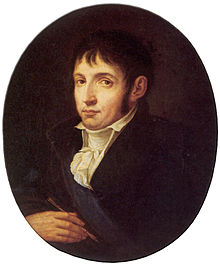Johann Evangelist foot
Johann Evangelist Fuß (Hungarian: János Fusz ) (born June 15 , baptized June 16, 1777 in Tolna , Hungary, † March 9, 1819 in Buda ) was a Hungarian composer and conductor .
Life
From 1801, Fuß was a piano teacher in Preßburg , later studied with Johann Georg Albrechtsberger in Vienna and returned to Preßburg in 1806. Through the mediation of his friend Joseph Krüchten, music by Fuß was performed in Ofen on March 19, 1806 as part of a celebratory event on the name day of Archduke Joseph's palatine, at which two friends of Beethoven also took part - the sisters Josephine Brunsvik and Therese Brunsvik . Beethoven himself had rejected the composition of the festival music.
From around 1812 to 1815 he worked again in Vienna, where he now also associated with Beethoven . On December 8, 1812, immediately after visiting Beethoven, he reported to the Breitkopf & Härtel publishing house of a conversation with the composer about his 7th symphony and the 8th symphony , both of which had not yet been performed in concert. Afterwards he lived again mainly in Pressburg.
Fuß was apparently in financial difficulties temporarily, because in February 1816 an advertisement appeared in Vienna in which “Johann Fuß from Pressburg, composer and conductor, lives at Fischplatz Nro. 759 ”, offers copies of his opera Romulus and Remus for sale. From Pressburg he also reported on various occasions for the Leipziger Allgemeine musical newspaper , for example in February 1816 on the respected music teacher Heinrich Klein from Pressburg. In the same year he took over the post of Kapellmeister at the theater in Pressburg.
The opera Romulus and Remus based on a libretto by Georg Friedrich Treitschke was one of his best-known works. Originally, Treitschke had entrusted the libretto to Beethoven, who decided to compose it in December 1814. In an unexplained way, however, it ended up in the hands of Fuß, whose Romulus and Remus were first performed in Vienna on September 9, 1816.
Fuß composed in most of the genres in which composers were active at the time, but was only highly regarded by his contemporaries as a vocal composer, especially for songs.
literature
- Ágnes Sas: The Life and Work of Janos Fusz . (= Studia Musicologica Academiae Scientiarum Hungaricae, Vol. 40). Akadémiai Kiadó
- Ágnes Sas (Ed.): Johann Evangelist Fuss. Songs and chants (and other secular vocal works) . (= Musicalia Danubiana; 21). MTA Zenetudományi Intézet, Budapest 2005, ISBN 978-963-7074-89-9 (sheet music with Hungarian and German text)
- Joseph Kürschner: Foot, Johann . In: Allgemeine Deutsche Biographie (ADB). Volume 8, Duncker & Humblot, Leipzig 1878, p. 252 f.
Individual evidence
- ↑ Klaus Martin Kopitz , Rainer Cadenbach (Ed.) U. a .: Beethoven from the point of view of his contemporaries in diaries, letters, poems and memories. Volume 1: Adamberger - Kuffner. Edited by the Beethoven Research Center at the Berlin University of the Arts. Henle, Munich 2009, ISBN 978-3-87328-120-2 , pp. 522-526.
- ↑ Klaus Martin Kopitz, Rainer Cadenbach (Ed.) U. a .: Beethoven from the point of view of his contemporaries in diaries, letters, poems and memories. Volume 1: Adamberger - Kuffner. Edited by the Beethoven Research Center at the Berlin University of the Arts. Henle, Munich 2009, ISBN 978-3-87328-120-2 , p. 290.
- ↑ Theater-Zeitung , Vienna, Vol. 9, No. 17 of February 28, 1816, p. 68 (digitized version)
- ↑ Allgemeine Musikische Zeitung , Vol. 18, No. 9 of February 1816, Col. 137f.
Web links
- Short biography , in: A Pallas Nagy Lexikona (Hungarian)
- Sheet music and audio files by Johann Evangelist Fuß in the International Music Score Library Project
| personal data | |
|---|---|
| SURNAME | Foot, Johann Evangelist |
| ALTERNATIVE NAMES | Fuss, Johann Evangelist; Fusz, János (Hungarian) |
| BRIEF DESCRIPTION | Hungarian-Austrian composer of the pre-classical period |
| DATE OF BIRTH | June 15, 1777 |
| PLACE OF BIRTH | Tolna , Hungary |
| DATE OF DEATH | March 9, 1819 |
| Place of death | Furnace , Hungary |
